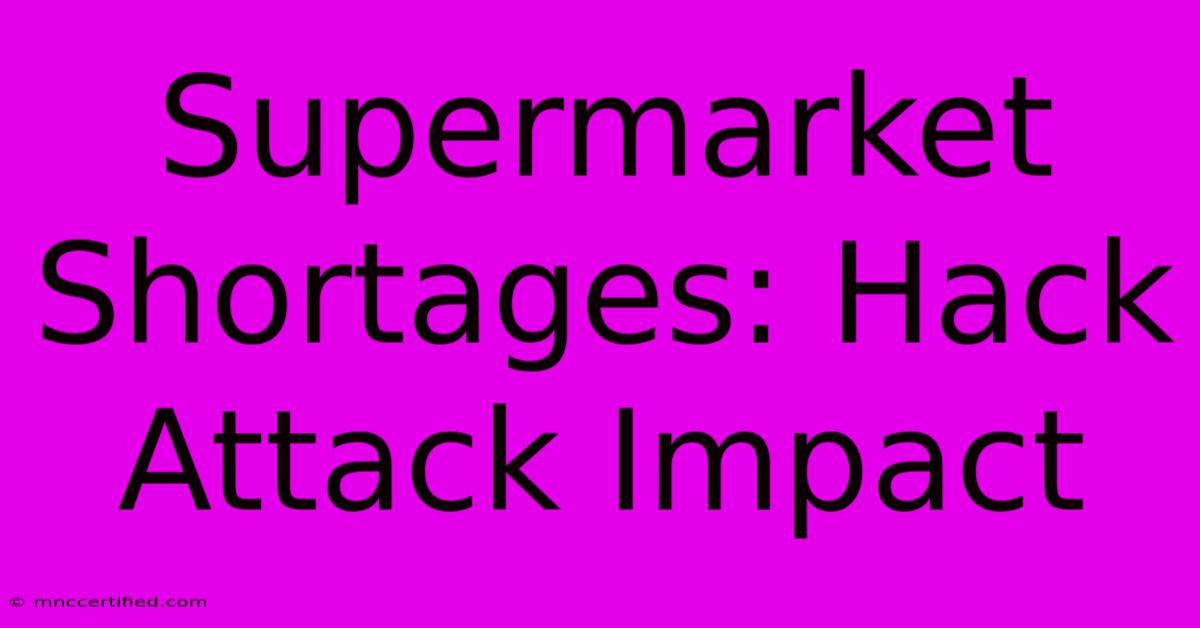Supermarket Shortages: Hack Attack Impact

Table of Contents
Supermarket Shortages: The Growing Impact of Hack Attacks
Supermarket shelves are increasingly bare, and while supply chain issues and inflation play a role, a hidden culprit is emerging: cyberattacks. Hackers targeting the food industry are causing significant disruptions, leading to product shortages and impacting consumers nationwide. This article delves into the escalating threat of hack attacks on supermarkets and the ripple effects felt across the supply chain.
The Vulnerability of the Grocery Supply Chain
The modern grocery supply chain is a complex network, highly reliant on technology. From inventory management systems and point-of-sale (POS) systems to transportation logistics and payment processing, every stage is susceptible to cyberattacks. A successful breach can have catastrophic consequences:
- Disrupted Production: Attacks targeting food processing plants can halt production lines, leading to immediate shortages of specific products. This is particularly impactful for perishable goods.
- Logistics Logjams: Compromised transportation systems can delay deliveries, causing empty shelves and increased spoilage. Hackers might even hijack delivery routes or manipulate tracking information.
- Inventory Management Chaos: Breaches in inventory management software can lead to inaccurate stock levels, resulting in over-ordering or, conversely, stock-outs. This affects both the supermarket's ability to predict demand and the efficiency of their ordering processes.
- Payment Processing Problems: Data breaches affecting payment systems can disrupt transactions, cause significant financial losses for supermarkets, and erode consumer trust. This can indirectly impact the supply chain as well.
Types of Cyberattacks Targeting Supermarkets
Supermarkets face a range of cyber threats, including:
- Ransomware Attacks: These attacks encrypt critical data, rendering systems unusable until a ransom is paid. This can cripple operations, leading to immediate shortages of various items.
- Data Breaches: Stolen customer data can result in identity theft and financial losses, damaging the supermarket's reputation and potentially impacting future sales.
- Denial-of-Service (DoS) Attacks: These attacks flood servers with traffic, making them unavailable to legitimate users. This can disrupt online ordering systems and cripple point-of-sale systems in physical stores.
- Supply Chain Attacks: These more sophisticated attacks target vendors or suppliers, disrupting the entire supply chain. The supermarket itself might not even be the direct target, yet it suffers the consequences.
The Long-Term Effects of Supermarket Hacks
The impact of these attacks extends far beyond empty shelves. They contribute to:
- Increased Food Prices: Shortages due to cyberattacks drive up prices, disproportionately affecting low-income families.
- Food Waste: Disruptions can lead to increased spoilage due to delayed deliveries and inaccurate inventory management.
- Reduced Consumer Trust: Data breaches and service disruptions erode consumer confidence, potentially driving customers to competitors.
- National Security Concerns: Attacks on the food supply chain can have national security implications, highlighting the vulnerability of critical infrastructure.
Protecting the Grocery Industry from Cyberattacks
Addressing this growing threat requires a multi-pronged approach:
- Enhanced Cybersecurity Measures: Supermarkets need to invest heavily in robust cybersecurity systems, including firewalls, intrusion detection systems, and regular security audits.
- Employee Training: Educating employees about phishing scams and other social engineering tactics is crucial in preventing attacks.
- Collaboration and Information Sharing: Collaboration between supermarkets, suppliers, and government agencies is essential for sharing threat intelligence and coordinating responses.
- Government Regulation: Clearer regulations and guidelines are needed to enhance cybersecurity standards across the food industry.
Conclusion:
Supermarket shortages are becoming increasingly complex, with cyberattacks emerging as a significant contributing factor. Addressing this challenge requires a concerted effort from the industry, government, and consumers to strengthen cybersecurity defenses and build a more resilient food supply chain. Ignoring this threat will only lead to more frequent and severe disruptions, impacting both businesses and consumers alike. The future of our grocery shopping experience depends on proactive measures to combat these growing cyber threats.

Thank you for visiting our website wich cover about Supermarket Shortages: Hack Attack Impact. We hope the information provided has been useful to you. Feel free to contact us if you have any questions or need further assistance. See you next time and dont miss to bookmark.
Featured Posts
-
Nhl Analyst Attacked In Arizona Altercation
Nov 27, 2024
-
Citys 3 3 Feyenoord Tie Key Stats
Nov 27, 2024
-
Vacant Land Insurance Coverage
Nov 27, 2024
-
Brand Ed And Manchester City New Sports School
Nov 27, 2024
-
Dhl Egypt Plans 10 07 Million Investment
Nov 27, 2024